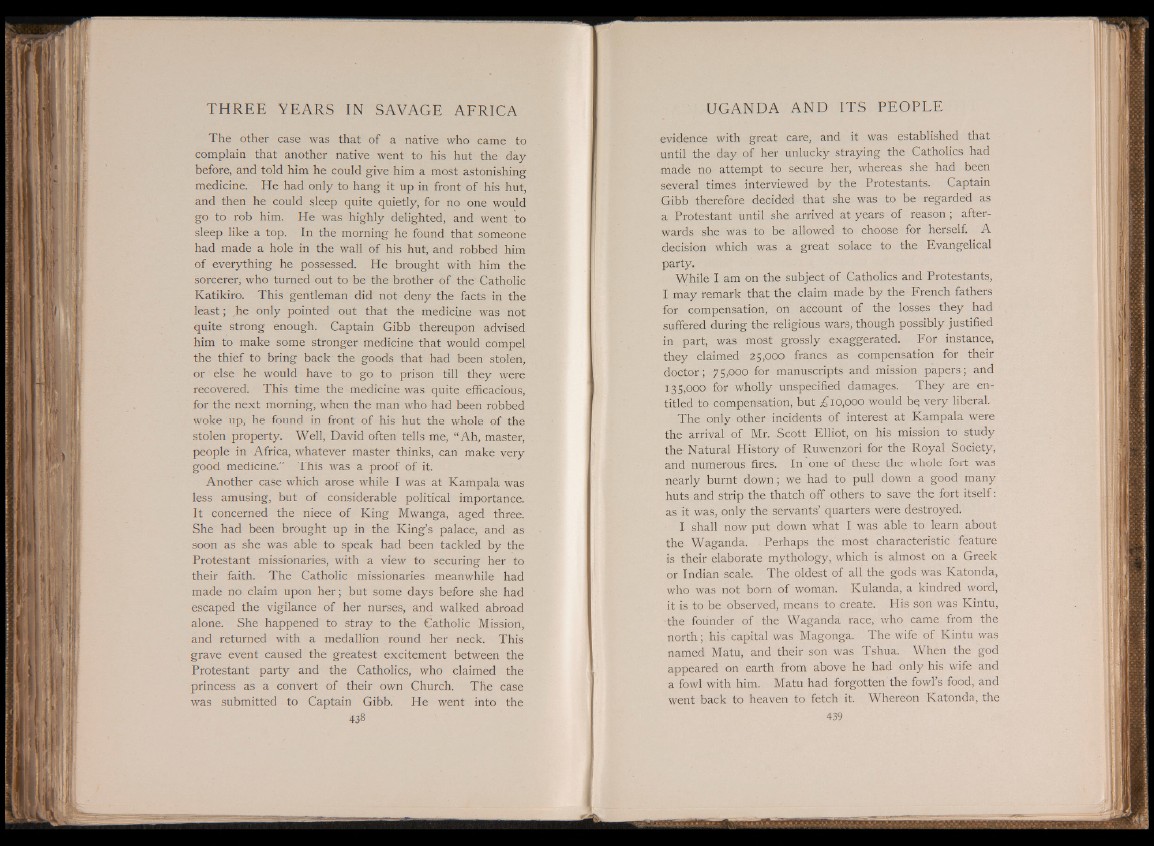
The other case was that of a native who came to
complain that another native went to his hut the day-
before, and told him he could give him a most astonishing
medicine. He had only to hang it up in front of his hut,
and then he could sleep quite quietly, for no one would
go to rob him. He was highly delighted, and went to
sleep like a top. In the morning he found that someone
had made a hole in the wall of his hut, and robbed him
of everything he possessed. He brought with him the
sorcerer, who turned out to be the brother of the Catholic
Katikiro. This gentleman did not deny the facts in the
least; he only pointed out that the medicine was not
quite strong enough. Captain Gibb thereupon advised
him to make some stronger medicine that would compel
the thief to bring back the goods that had been stolen,
or else he would have to go to prison till they were
recovered. This time the medicine was quite efficacious,
for the next morning, when the man who had been robbed
woke up, he found in front of his hut the whole of the
stolen property. Well, David often tells me, “Ah, master,
people in Africa, whatever master thinks, can make very
good medicine.” This was a proof of it.
Another case which arose while I was at Kampala was
less amusing, but of considerable political importance.
It concerned the niece of King Mwanga, aged three.
She had been brought up in the King’s palace, and as
soon as she was able to speak had been tackled by the
Protestant missionaries, with a view to securing her to
their faith. The Catholic missionaries meanwhile had
made no claim upon her; but some days before she had
escaped the vigilance of her nurses, and walked abroad
alone. She happened to stray to the Catholic Mission,
and returned with a medallion round her neck. This
grave event caused the greatest excitement between the
Protestant party and the Catholics, who claimed the
princess as a convert of their own Church. The case
was submitted to Captain Gibb. He went into the
438
evidence with great care, and it was established that
until the day of her unlucky straying the Catholics had
made no attempt to secure her, whereas she had been
several times interviewed by the Protestants. Captain
Gibb therefore decided that she was to be regarded as
a Protestant until she arrived at years of reason ; afterwards
she was to be allowed to choose for herself. A
decision which was a great solace to the Evangelical
party.
While I am on the subject of Catholics and Protestants,
I may remark that the claim made by the French fathers
for compensation, on account of the losses they had
suffered during the religious wars, though possibly justified
in part, was most grossly exaggerated. For instance,
they claimed 25,000 francs as compensation for their
doctor; 75,000 for manuscripts and mission papers; and
135,000 for wholly unspecified damages. They are entitled
to compensation, but A 10,000 would bq very liberal.
The only other incidents of interest at Kampala were
the arrival of Mr. Scott Elliot, on his mission to study
the Natural History of Ruwenzori for the Royal Society,
and numerous fires. In one of these the whole fort was
nearly burnt down ; we had to pull down a good many
huts and strip the thatch off others to save the fort itself :
as it was, only the servants’ quarters were destroyed.
I shall now put down what I was able to learn about
the Waganda. Perhaps the most characteristic feature
is their elaborate mythology, which is almost on a Greek
or Indian scale. The oldest of all the gods was Katonda,
who was not born of woman. Kulanda, a kindred word,
it is to be observed, means to create. His son was Kintu,
the founder of the Waganda race, who came from the
north ; his capital was Magonga. The wife of Kintu was
named Matu, and their son was Tshua. When the god
appeared on earth from above he had only his wife and
a fowl with him. Matu had forgotten the fowl’s food, and
went back to heaven to fetch it. Whereon Katondn, the